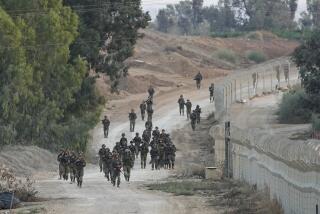Counterterror Can Revert to Terror : Highly Trained Specialists Can Be Susceptible to the Money Lure
- Share via
The response of democracies to terrorism--the development of uniquely trained counterterrorism forces--has paradoxically created a potentially grave threat to the same nations and values these forces were created to defend.
There have, of course, been notable successes. The Israeli raid at Entebbe, Uganda, in 1976, the German recovery of a Lufthansa 737 in Mogadishu, Somalia, in 1977, and the British recovery of the Iranian Embassy in London in 1980 were among the events that helped to reassure Western democracies that they did not have to endure terrorism helplessly.
Less apparent are the associated risks: anti-terrorist personnel become part of the growing talent pool prospectively available to those who control the sort of money most men never dream of--least of all these soldiers who undertake to counterterrorism.
Those of us dealing with terrorism over an extended period have regularly shared concerns about the future of the forces being created and made ready for such work. In spite of all the grueling preparation and incessant training associated with their peculiar endeavor, the chances of their being used is extremely remote. They dedicate themselves to a task they will probably never perform. Deep-breathing exercises and meditation are fine, but they don’t dissipate all of the frustrations in all the people honed to these lethal tasks.
These men also receive soldiers’ salaries. The physical and intellectual energy they devote to their tasks and the risks they take in their performance can never be reflected in their pay envelopes. It began to seem inevitable that some would consider the prospects of putting their skills at the disposal of those who could pay amply for them.
Thus, it came as no surprise to learn that former Israeli and British commandos were allegedly training shooters for the Medellin cocaine cartel. But this may not begin to reflect the true extent of the danger stemming from the proliferation of the capabilities such men possess.
Marketing their skills to businesses and government agencies around the world, such groups are capable of penetrating corporate and public facilities and operations vital to the well-being of other nations. There is no control over the flow of the knowledge they gain, nor over that which they provide to others.
Israel is especially sensitive to the problem of citizens cashing in on its carefully cultivated image of invincibility in dealing with terrorism. The number of people, just in the United States, representing themselves as “the former director of security for El Al” is remarkable. If each one is telling the truth, El Al has more directors of security than it has airplanes. Prime Minister Yitzhak Shamir was recently quoted as saying: “It is not pleasant to hear that there are Israelis dealing in ugly things (but) the state of Israel cannot be responsible for them.”
The British were dealing with terrorism many years before the problem acquired currency among its allies. They have long recognized the ancillary problems associated with those possessing certain salable martial skills. Once, the British Empire afforded greater space for such people to ply their professions more or less quietly, if not harmlessly. Today, some of the same sort of people are denied entry to the United States on the basis of their mercenary activities.
Though the United States came late to the development of counterterrorism forces, it has not escaped the second-order consequences of their development. Schools offering to teach a range of arcane skills, from the use of explosives to silent killing, have multiplied as terrorism, or an association with it, has acquired an inexplicable panache.
Some of these operations merely indulge the Rambo-esque fantasies of barroom commandos. But not all are so harmless. Two Sikhs believed associated with the June, 1985, bombing of an Air India 747 were suspected of having learned their craft at a “reconnaissance commando school” in Alabama the year before.
The proliferation of lethal capabilities for legitimate purposes of public defense, the sudden existence of a private market for those capabilities, and the means and motives for spending millions to procure them, are a source of danger not anticipated when the first successes against terrorism were recorded nearly 20 years ago.
Sadly, the collateral consequences of the war on terrorism may present a far greater threat to the safety of the Western democracies than terrorism itself.
More to Read
Sign up for Essential California
The most important California stories and recommendations in your inbox every morning.
You may occasionally receive promotional content from the Los Angeles Times.













